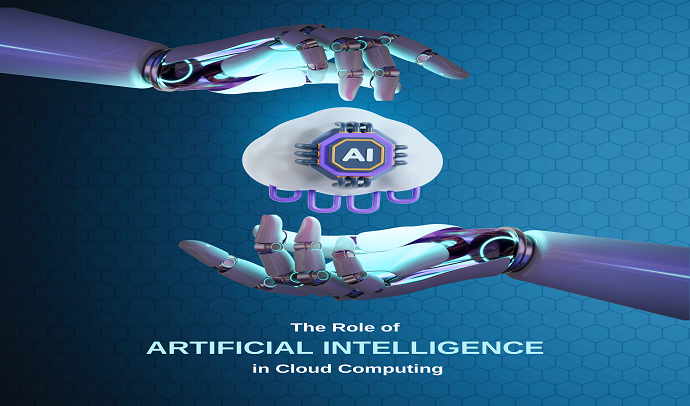Introduction
In today’s rapidly evolving technological landscape, the convergence of Artificial Intelligence (AI) and Cloud Computing stands as a pivotal advancement with transformative potential. Let’s explore how this dynamic partnership is revolutionizing industries, and uncover its benefits, applications, and future trends.

Understanding Cloud Computing:
Cloud computing refers to the delivery of various computing services over the Internet, including storage, processing, networking, and software. Instead of relying on local servers or personal computers, cloud computing leverages a network of remote servers hosted in data centers. Key characteristics of cloud computing include:
- On-Demand Self-Service: Users can provision and manage resources without human intervention from service providers.
- Broad Network Access: Cloud services are accessible from various devices, enabling remote work and ubiquitous data access.
- Resource Pooling: Cloud providers efficiently utilize shared resources across multiple customers.
- Rapid Elasticity: Cloud resources can be quickly scaled up or down to handle changing workloads.
- Measured Service: Users pay only for the resources they use, making it cost-effective.
The AI-Cloud Computing Alliance:
Artificial Intelligence, often abbreviated as AI, is a field of computer science that focuses on creating intelligent machines capable of learning, reasoning, and problem-solving. When AI collaborates with cloud computing, it enhances various facets of cloud services:
- Automation: AI automates complex tasks, optimizing system performance and resource allocation.
- Personalization: AI tailors services based on user preferences, improving user experiences.
- Security: AI detects anomalies, protects against threats, and enhances data security.
- Efficiency: AI-driven algorithms optimize workflows, reducing operational costs.
- Innovation: AI enables novel applications and services, driving business innovation.
Benefits and Applications:
The fusion of AI and cloud computing unlocks new dimensions:
- Predictive Analytics: AI models analyse vast datasets stored in the cloud, providing insights for decision-making.
- Natural Language Processing (NLP): Cloud-based NLP services power chatbots, virtual assistants, and sentiment analysis.
- Machine Learning as a Service (MLaaS): Cloud platforms offer ML tools, making it easier for developers to build and deploy models
- Scalability: AI workloads can scale dynamically in the cloud, handling varying demands.
- Cost Optimization: AI-driven resource allocation minimises wastage and reduces expenses.
Future Trends
As AI continues to evolve, we can expect the following trends in AI- cloud integration:
- Edge AI: AI models deployed at the edge (closer to devices) for real-time processing.
- Federated Learning: Collaborative AI training across distributed cloud environments.
- Ethical AI: Ensuring fairness, transparency, and accountability in AI-powered cloud services.
Conclusion
- The integration of Artificial Intelligence with Cloud Computing promises transformative advancements.
- Empower businesses to achieve unprecedented efficiency, innovation, and competitiveness.
- The synergy between AI and cloud technologies opens the door to a future of collaborative progress.
- Intelligent systems and cloud infrastructure work together to drive innovation across diverse industries.
- The journey has only just begun, with limitless potential for groundbreaking developments on the horizon.
- Delve into Cloudopty to uncover the significance of Artificial Intelligence in Cloud Computing.
For a deeper understanding of this topic, please refer to the following articles:
